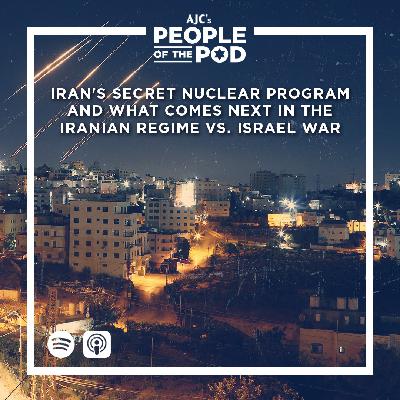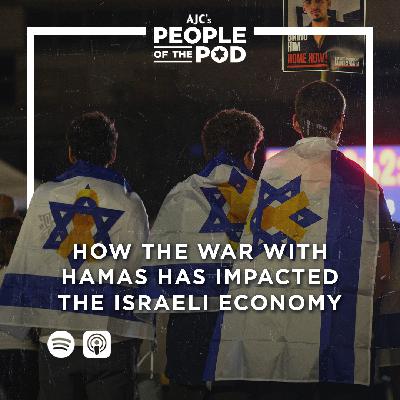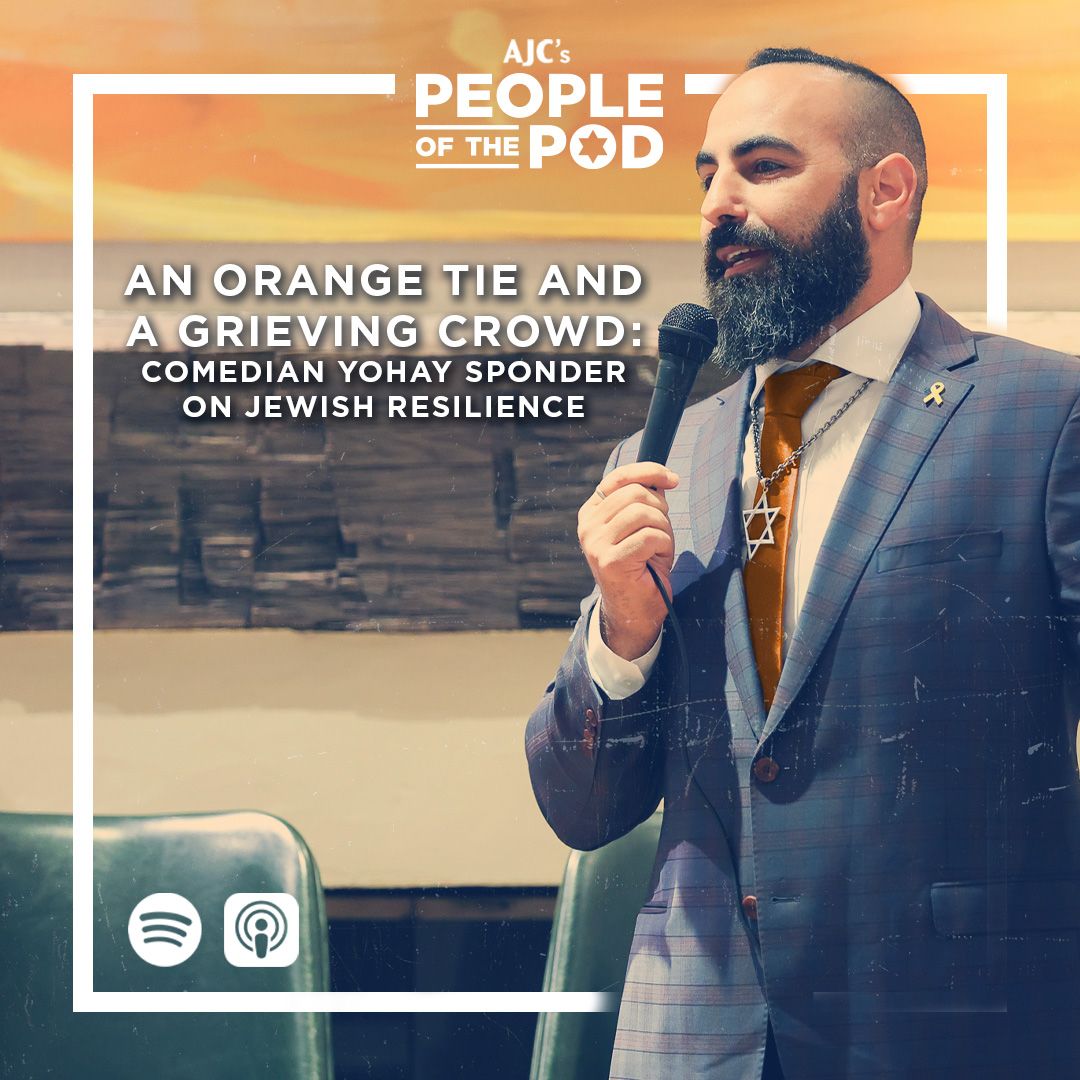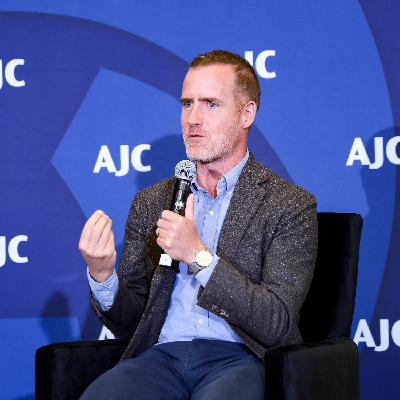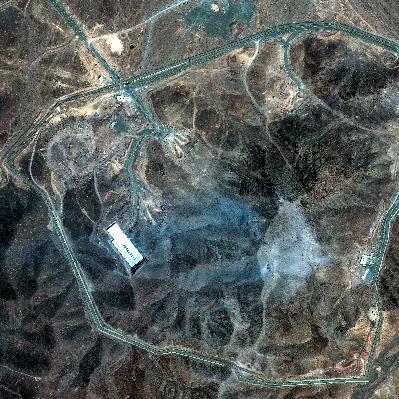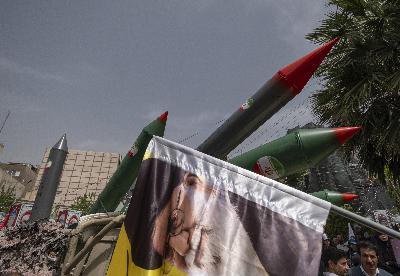Iran's Secret Nuclear Program and What Comes Next in the Iranian Regime vs. Israel War
Description
Since Israel launched Operation Rising Lion—a precise and defensive military campaign aimed at preventing the Iranian regime from acquiring nuclear weapons—Iran has responded with a barrage of ballistic missiles and drones, indiscriminately targeting Israeli civilians. Dr. Matthew Levitt, director of the Reinhard Program on Counterterrorism and Intelligence at the Washington Institute for Near East Policy, and a leading expert on Iran's global terror network, explains what's at stake—and what could come next.
Take Action:
-
We must stop a regime that vows to murder millions of Israelis from gaining the weapons to do it. Urge your elected leaders to assure that Israel has all the necessary support to end Iran's nuclear threat.
Resources and Analysis:
-
Iranian Regime vs. Israel War Explained: What You Should Know
-
AJC Advocacy Anywhere: Israel and Iran: Latest Updates, Global Responses, and the Path Ahead
-
5 Key Reasons Behind Israel's Defensive Strike on Iran's Imminent Nuclear Threat
Listen – AJC Podcasts:
Follow People of the Pod on your favorite podcast app, and learn more at AJC.org/PeopleofthePod
You can reach us at: peopleofthepod@ajc.org
If you've appreciated this episode, please be sure to tell your friends, and rate and review us on Apple Podcasts or Spotify.
Transcript of the Interview:
Israel's shadow war with the Iranian regime, the world's leading state sponsor of terrorism, erupted into open conflict last week following a stunning report from the International Atomic Energy Agency that confirmed Iran was much closer to obtaining nuclear weapons than previously known. Since Israel launched a wave of attacks on nuclear sites and facilities, Iran has fired missiles toward Israel's most populated cities. Joining us to discuss what this all means is one of the foremost experts on Iran and its global threats, and a regular guest when trouble arises with Iran. Dr. Matthew Levitt, director of the Reinhard Counterterrorism Program at the Washington Institute for Near East Policy.
Matt, welcome back to People of the Pod.
Matthew Levitt:
It's a pleasure to be back, but I need to come sometime when the world's okay.
Manya Brachear Pashman:
That would be nice. That'd be nice. But what will we talk about?
Matthew Levitt:
Yeah, just call me one of the Horsemen of the Apocalypse.
Manya Brachear Pashman:
Well, you are one of the foremost experts on the dangers posed by Iran, especially its terror proxies. And you've written the definitive book on Hezbollah, titled Hezbollah: the Global Footprint of Lebanon's Party of God. And I say that whole title, I want to get in there, because we are talking about global threats here.
Can you explain the scale of Iran's global threat and the critical role that its terror proxies, like Hezbollah, Hamas, the Houthis, play in advancing that strategy?
Matthew Levitt:
So I really appreciate the question, because it's really important to remind listeners that the Israel Iran war did not start Thursday night US time, Friday morning, Israel time. In fact, it's just the latest salvo where the Israelis, after years and years and years of Iranian we call it malign activity, but that's too soft a term. We're talking about Iran sending weapons and funds to proxies like Hamas to carry out October 7, like Hezbollah to fire rockets at Israel almost daily for almost a year. Like the Houthis, who were much more than a thorn in the Saudi backside until the Iranians came and gave them more sophisticated capabilities.
We're talking about an Iran that a few years ago decided that instead of making sure that every gun that it sent to the West Bank had to go to Hamas or Islamic Jihad. They decided to just flood the West Bank with guns. Who cares who's shooting at the Israelis so long as somebody is. And an Iran that not only carries out human rights abuses of all kinds at home, but that threatens Israel and its neighbors with drones, low altitude cruise missiles, short range ballistic missiles, and medium and long range ballistic missiles.
And so the totality of this, much like the totality of Hezbollah's striking Israel for almost a year, ultimately led Israel to do what most people thought couldn't be done, and just tear Hezbollah apart, that the Israel war on Hezbollah is the prequel to what we've been seeing over the past few days in Iran. Similarly, for the Israelis, it got to be too much. It wasn't even really that President Trump's 60 days expired and Israel attacked on day 61. It wasn't only that the IAEA came out with a report saying that the Iranians have refused to explain certain activities that can only be explained as nuclear weaponization activities.
It was that the Israelis had information that two things were happening. One, that Iran was working very, very hard to rebuild its capability to manufacture medium, long range ballistic missiles that can hit Israel. After the Israeli reprisal attack last October took out a key component of that program, the mixers that are important for the solid propellant, without which you can't make ballistic missiles. And Iran is believed to have, at least the beginning of this recent round of the conflict –Thursday, Friday–about 2000 such missiles. Far fewer now, the Israelis say they've taken out about a third of them, plus launchers, plus radars, et cetera. But that Iran had a plan within just a few years to develop as many as 8000 of these. And that simply was not tolerable for the Israelis.
And the second is that the Israelis say that they compiled evidence that Iran had a secret, secret nuclear weapons program that had been going on predating October 7, but was fast tracked after October 7, that they were planning to maintain this program, even as they were negotiating over the more overt program with the Trump administration. President Trump has even taken issue with his own Director of National Intelligence Tulsi Gabbard, who testified in March that the US intelligence committee does not assess that Iran is weaponizing. And President says, I don't care what she says, I think they were very close to weaponizing.
The Israelis say they have shared this information at least recently with their US counterparts and that was not tolerable. So the primary goals that Israel has set out for itself with this campaign is beyond the critically important shattering the glass ceiling. Think where people in particular, in Iran thought this would never happen, was two things, one, addressing and significantly degrading and setting back the Iranian ballistic missile production program, and second, doing the same to the nuclear program. They've already carried out strikes at Isfahan, Natanz, even at the upper parts of Fordow. And there is an expectation that the Israelis are going to do something more. The Israeli national security advisor said on Israeli television today, We are not going to stop without addressing the nuclear activities at Fordow.
Manya Brachear Pashman:
You know, you called it a prequel, Israel's operations against Hezbollah last year. Did you know that it was a prequel at the time and to what extent did it weaken Iran and leave it more vulnerable in this particular war?
Matthew Levitt:
I'm going to be the last person in Washington, D.C. who tells you when he doesn't know. And anybody who tells you they did know is lying to you. None of us saw what Israel did to Hezbollah coming. None of us saw that and said, Oh, they did it to a non-state actor right across their border. So they'll definitely be able to do it to Iran, 1000+ kilometers away, big nation state with massive arsenals and a nuclear program and lots of proxies. One plus one does not equal three in this.
In other words, the fact that Israel developed mind boggling capabilities and incredible intelligence, dominance and then special tools, pagers and walkie talkies, in the case of Hezbollah, did not mean that they were going to be able to do the same vis a vis Iran. And they di

